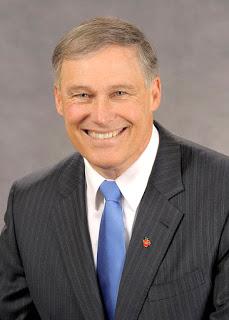 The Democratic Party's field of presidential candidates is still growing. On Friday, second-term Governor of Washington, Jay Inslee, tossed his hat in the ring. Inslee's main campaign theme will be combatting global climate change.
The Democratic Party's field of presidential candidates is still growing. On Friday, second-term Governor of Washington, Jay Inslee, tossed his hat in the ring. Inslee's main campaign theme will be combatting global climate change.Inslee said he understood that he is a "dark horse" candidate -- unknown by many voters across the country. But he hopes to repeat the success of two other virtually unknown small-state Democrats who got the Democratic nomination and went on to be elected president -- Jimmy Carter and Bill Clinton.
Inslee's entrance into the race brings the total number of candidates seeking the Democratic nomination to 13. And that is without Joe Biden, Beto O'Rourke, and Michael Bloomberg -- all of whom are expected to enter the race soon.
Here are the candidates who have officially entered the race for the Democratic nomination:
Sen. Bernie Sanders (I-VT): The 2016 runner-up is running again. He has the biggest grassroots base of any potential candidate, and he has been the leader of the push to move the party leftward. Press reports of staff sexual misconduct within his 2016 campaign and a more competitive field will present Sanders with a very different race this time, however. Still, for many of the Democratic left, Sanders is the only candidate with the credibility to pursue their top-tier issues, like Medicare-for-all. Sen. Kamala Harris (D-CA): The former California attorney general started generating White House hype almost as soon as she got to the Senate in 2017. As a younger black woman, she personifies the Democratic Party’s changing nature. She’s endorsed Medicare-for-all and proposed a major middle-class tax credit, though her days as a prosecutor may present problems with the progressive grassroots. Based on the early polls and media hype, Harris has made the biggest splash of any Democrats not named Sanders. Sen. Elizabeth Warren (D-MA): The Massachusetts senator is proudly progressive, though she tends to position herself as wanting to fix capitalism rather than replace it. She wants to outflank Trump on trade and give workers seats on corporate boards and tax extreme wealth. Warren got on the ground early in Iowa and other early states. (You might have also heard about her releasing a DNA test in an attempt to prove she had Native American roots — a poorly executed attempt to rebut Trump’s “Pocahontas” taunts.) Sen. Cory Booker (D-NJ): The former Newark mayor and part-time firefighter is another fresh face with big ideas like savings accounts for newborns, and he’s also running in a Democratic primary with a lot of black voters. He’ll have to contend, though, with his work promoting charter schools (not a favorite of the teachers unions) and the perception that he’s close with Wall Street. Sen. Kirsten Gillibrand (D-NY): Gillibrand has evolved over the years from a centrist Democrat in the House to a progressive who endorses Medicare-for-all and universal paid family leave; a pillar of her Senate career has been cracking down on sexual assault in the military. Gillibrand is presenting herself as a young mom in tune with the #MeToo era and the Democratic women who powered the party to historic wins in the 2018 midterms. Sen. Amy Klobuchar (D-MN): She will look to blend her folksy, Midwestern manner with some crossover appeal, given her history of working across the aisle with Republicans and winning elections handily in a purplish state. Klobuchar is also known for her willingness to crack down on big tech firms, focused on privacy and antitrust issues. She is struggling with a lack of name recognition, however, and she has been the subject of several recent reportsabout her alleged harsh treatment of staff. Washington Gov. Jay Inslee: Inslee is centering his work on environmental issues and the threat of climate change. He has pushed a bill to get his home state off coal energy and all other carbon-producing energy sources by 2045. It hasn’t always been smooth — voters in Washington rejected an Inslee-supported carbon fee in 2015 — but the governor hopes to quickly build a profile by focusing relentlessly on humanity’s direst existential threat. Former San Antonio mayor and HUD Secretary Julián Castro: Castro got VP buzz in prior elections; now he’s running in his own right after serving in Barack Obama’s Cabinet, on an aspirational message as the grandson of immigrants. Rep. Tulsi Gabbard (D-HI): Gabbard fires up a certain strain of antiwar progressive. She’ll face tough questions, though, about her apparent friendliness with Syrian dictator Bashar al-Assad and her past comments on LGBTQ rights. Former Rep. John Delaney: The most notable thing about Delaney is he’s already been running for president for two years, more or less living in Iowa, the first state on the presidential calendar. But he was the first choice of just 1 percent of Iowa Democrats in a recent poll. South Bend, Indiana, Mayor Pete Buttigieg: Something of a viral political star, though he leads a city of “just” 100,000 people, Buttigieg is a military veteran and a Rhodes scholar, and he would be the first openly LGBTQ president in American history. Redevelopment and infrastructure projects have been staples of his tenure as mayor. Andrew Yang: A humanitarian-mind entrepreneur who also served under the Obama administration. He’s running on a policy platform that includes, among other things, a universal basic income that would pay out $1,000 a month to every American over age 18. Marianne Williamson: A self-proclaimed “bitch for God” who has been a spiritual adviser to Oprah. Her previous political experience is a failed run for Congress as an independent in 2014.

